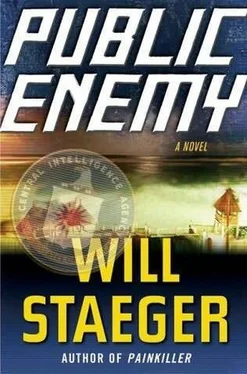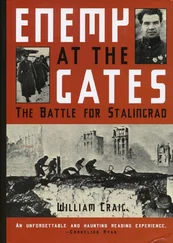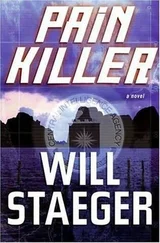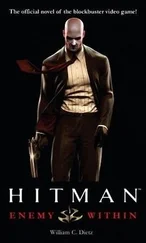Cooper looked at her, and couldn’t see it in the dark, but thought suddenly of the tiny mole he knew existed just above her right ear, which he remembered having noticed the second time they made love. It had been an awkward session-each of them recovering from fairly morbid gunshot wounds but still finding the places each needed to find.
Another thought I need to purge.
“Of course, even if you found nothing,” he said, “you figured you might just be able to use this Havana vacation of ours to talk things through with your operative. Maybe catch a little R & R, even, before returning to strategy central and good old Professor Eddie.”
“Stop it,” she said. “This may surprise you, but I’m not necessarily interested in taking any R & R. Don’t you realize the stakes here? What’s wrong with you?”
Cooper almost grinned, thinking he’d finally struck paydirt.
“I’m trying to figure out who these assholes are, and you’re goofing off?” she said. “No, I take that back: you’re flirting.”
“Me?”
“Stop it.”
She was staring at him again, maybe shooting him an evil eye, but Cooper couldn’t really see her in the failing light. He locked the steering wheel, stood, balanced his way forward, found the onboard fridge he’d loaded up before they left, withdrew a Budweiser longneck for himself and the bottle of Chardonnay he’d brought for her. Might not last long in that landlubber’s stomach of hers on the ocean in the dark-but Laramie, he thought, needs a goddamn drink.
He came back to their spot near the helm, opened the bottle, poured and handed her a paper cupful of the wine, popped his Bud, then did his best to clink his beer against the paper cup for a toast.
“Relax, lie detector,” he said.
After a while, Laramie said, “Yeah?”
“Yeah,” he said. He slid back into his place behind the wheel, discovering, as he settled in, that he was feeling something close to what he’d felt during those times when he’d been away from Conch Bay for a week, or month, and took his swimming goggles and headed out to poke around the reef. Familiar territory, warming his cold soul like ninety-proof bourbon going down the hatch.
“You know what we’re going to find?” he said.
“No,” she said.
“We’re going to find what we’re going to find,” he said.
Laramie didn’t say anything for a while. He assumed she was drinking some of the wine.
“That’s very Zen of you,” she finally said from the darkness.
“Live slow, mon,” Cooper said, and put away some of his beer.
Two hours later, nursing his fourth Budweiser, Cooper found to his amazement that Laramie had not yet fallen victim to a bout of seasickness. During those two hours, while they rode in relative silence, Cooper considered, then made his decision, reflecting, as he went in circles, that he didn’t have a choice. Any way he looked at it, he was going to have to tell her what he’d found. As she’d put it herself, too much was at stake.
He was just going to have to do a better job of keeping the snuffer-outers away from Laramie than he’d done for Cap’n Roy.
Plus, there was the selfish angle. He wasn’t quite willing to accept himself as a good soldier, obligated to perform good deeds in service of the safety of American citizens. These citizens were part of a nation that had fucked him over, up, and down-with little remorse-more than once. And according to the theory he was following as to the identity of the snuffer-outers, somebody with considerable power, working for the government of that nation, had arranged the killing not only of Cap’n Roy and a few other relatively innocent souls-but, by intention or utter, careless negligence, of an entire Indian civilization.
And by invoking Laramie, the human lie detector machine, he might just be able to turn her against the people she worked for in service of his own case-and the vengeance those voices in his head were asking him to seek.
The people Laramie works for, he thought, are bound to know some-thing-or maybe everything-about that fucking factory, the people who burned it to the ground, and the chief snuffer-outer I’m looking to put at the top of my dead pool.
And considering they’ve made the mistake of hiring the human lie detector machine, maybe I can put this to my advantage and squeeze some info out of the equation.
Cooper peered into the shadows where Laramie was seated and tried to determine whether she was awake. He couldn’t, so he said, “You actually took the Dramamine?”
She had never abided by his suggestion before.
“I did,” she said from the darkness.
“We’ve got a few hours to kill,” Cooper said.
When Laramie didn’t say anything, Cooper realized what it sounded as though he was implying-or proposing. He enjoyed the moment of crackling tension, imagined or real, before explaining himself after a while.
“Reason I mention that,” he said, “is there’s a story you should probably hear.”
“A story,” Laramie said after her own measured delay. “What about?”
Cooper grunted. “Among other things,” he said, “a twelve-inch priestess, a murdered chief minister, and a guy who calls himself the Polar Bear.”
The sound of waves, and a mild rush of breeze, came at them for a moment.
“Sounds like one hell of a story,” Laramie said.
“You’ve got no idea,” Cooper said, and commenced to killing time with his tale, careful to clarify how he thought it may well connect to the intended wrath of the suicide sleepers she hoped to thwart.
Cuba’s Revolutionary Navy, Cooper knew, wasn’t particularly adept at protecting its own coast, with the notable exception of a few ruthless attacks on Cuban citizens, conducted during the citizens’ attempts to flee the regime. Castro’s army, the Revolutionary Armed Forces, was nearly as ill-equipped, essentially operating on a zero-budget basis since the COMECON money train-the Soviet Union’s foreign-aid package for communist partners-derailed in the early nineties. The FAR, as it was known, had succeeded in shooting down the occasional Cessna, and its army managed to keep Fidel alive-but such expensive tools of modern warfare as effective coastal radar installations were, for the Republic of Cuba, the stuff of nostalgia.
San Cristóbal was part of the Pinar del Rio province, on the southern side of the island, just over a hundred and twenty miles from the western tip. They made good time on the flat seas, coming in around two-thirty A.M. to a beach Cooper had used before. He’d navigated tonight strictly by compass, thinking, as he flicked on his flashlight and aimed it toward the beach, that the old Cuban fisherman in Hemingway’s famous book couldn’t have worked his way to San Cristóbal any better. He killed the engine as they hit shallow water and drifted in; after a few seconds the twin hulls made a dull scraping noise. Cooper secured the outboard and slipped over the side into the shallow water. He’d left his Reefs in the boat and felt the grainy sand noodle up between his toes as he touched bottom. He pulled the boat onto the beach and told Laramie she could jump out.
They unloaded their gear-two Mongoose touring bikes and a pair of tall backpacks, the backpacks outfitted with a variety of equipment, food, and drink. Then Cooper pushed the boat back into the water and guided the catamaran to the eastern end of the beach where he dragged it behind a mound of driftwood. Laramie watched as Cooper vanished into a thicket of bushes, broke off some branches, and came out again to lay them across the boat. He came over and pulled the bikes and backpacks up the beach, tucked them too behind some driftwood then came back down to Laramie, who’d stayed firmly planted in the sand in order to shake off the last of the effects of the sea.
Читать дальше





![Томас Гарди - Джуд неудачник [Литрес, Public Domain]](/books/437392/tomas-gardi-dzhud-neudachnik-litres-public-domain-thumb.webp)






